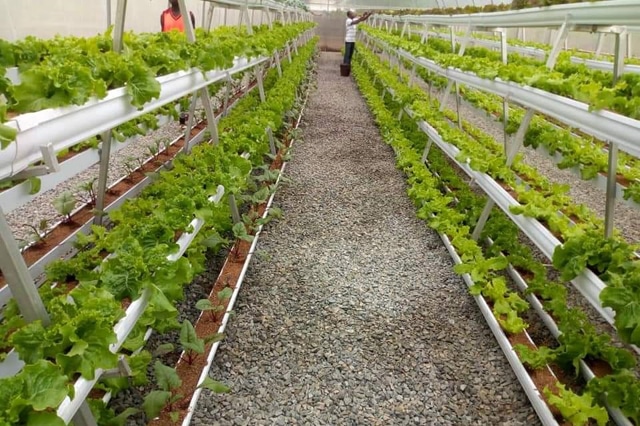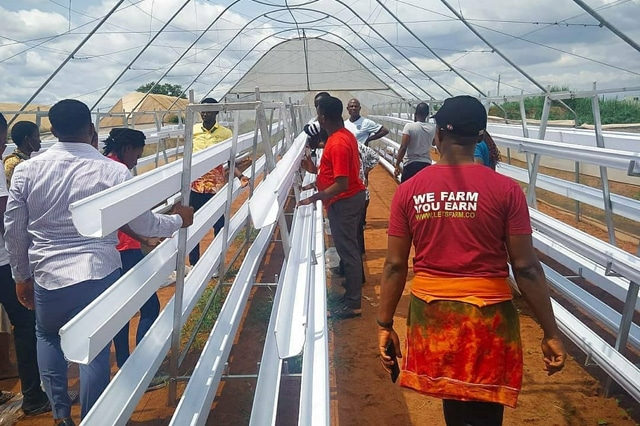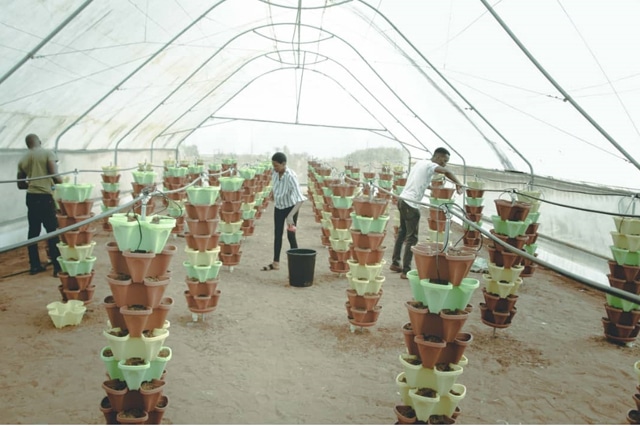Background
A Nigerian national, farmer Samson Ogbole is the lead trainer for Farm Lab. Agriculture for Samson is more than just food production (zero hunger). It is the foundation for sustainable development, job creation (poverty alleviation), healthier living as well as national development.
Samson has attained a B.Sc. Biochemistry, Igbinedion University; M.Sc. Biochemistry, Ibadan University, and he is a Biochemistry PhD candidate at Federal University of Agriculture, Abeokuta.
He is a postgraduate student of Machine Learning and Artificial Intelligence at The University of Texas, Austin, USA.
Samson is also a two time TEDx speaker and a one-time TED speaker; recognized amongst the top 7 innovators in Africa in the year 2018 by CNN Africa.
His creativity and entrepreneurial drive has had him featured on the BBC, CNN, Reuters and many other TV channels. He has also featured in every major tabloid news outlet in Nigeria, and many more.
Insights
AGN: How would you describe vertical farming to someone who is hearing about it for the first time?
SO: I would say it is the ability to plant on multiple layers while taking advantage of the vertical space.
AGN: What are the general misconceptions people have about vertical farming?
SO: a) initially people assumed produce would be unhealthy because they considered it to be less natural than soil based farming
b) people assume all systems are expensive
c) vertical farming systems and processes have to be complicated
AGN: Do you favor any particular vertical farming systems?
SO: I do not adhere to any particular system but determine suitability based on an Asset Based Community Development (ABCD) approach. This is an approach that I learned about via the University of Wageningen in The Netherlands. Development of this approach is actually credited to John P. Kretzmann and John L. McKnight of the Institute for Policy Research at Northwestern University, Evanston, Illinois, USA.
The key thing for me is to choose a system that best allows the plant to express itself to its optimum while of course taking into account locally available resources and human capacity.

AGN: Please could you highlight some of the advantages of vertical farming?
SO: a) it allows for production that is independent of seasons
b) it is far less susceptible to climate change
c) it allows for greater flexibility to grow a wider range of produce within the same space
d) reduction in costs can be achieved due to operational efficiencies, i.e. what you haven’t planted won’t grow so there is no need to expend resources to suppress weeds or to deploy other remedies to keep unwanted growth at bay. Continuing with this point. Chemical usage is reduced which again saves costs and is also beneficial to the environment.
Modern, conventional soil based farming to an extent is founded on a loose framework of applying agro chemicals. The residue seeps into the environment which can be damaging. In soil-less farming you can be more precise about giving plants what they need.
e) Comparative studies have revealed produce from vertical farms have higher levels of phytochemicals and are highly nutritious. There is certainly a strong case to be made in terms of the health benefits of consuming more nutritious produce harvested from vertical farms.
AGN: From an African perspective, please could you highlight some of the disadvantages of vertical farming in relation to utilizing it at scale?
SO: a) currently the setup costs for all but simple small-scale projects are typically higher.
b) ongoing costs in relation to power usage can also be a factor. Having said that the farms I design tend to be less energy dependent. It should also be noted that solar power and/or gravity fed systems allow for things to be modified for African operations where constant power may not be readily available.
c) compared to developed economies, there is a lack of comprehensive data or guidelines that set out what nutrients and conditions are appropriate to grow a wide range of produce in Africa. The information that is available doesn’t cover a wide enough range of produce.
While universities and research institutions are doing their bit, progress is slow. It is undeniable that some worthwhile and credible pieces of work have been done that have led to good quality guidelines being readily available.
Having said that, some of the information that has been published gives one cause to pause. More work needs to be done in terms of standardization and the robustness of peer review mechanisms in order to ensure standards are not diluted. In some cases due to a lack of appropriate information, farmers are having to experiment out of need rather than choice.

AGN: In a CNN article about you it says you are trying to solve a problem many aren’t aware exists in Nigeria, it goes on to cite the amount of farmland under cultivation as being 30 million hectares which is short of 78.5 million hectares needed for the population of the country during the time the article was written. In terms of increasing output are vertical systems the only answer?
SO: No. I don’t believe there is any one answer as not everything can suitably be grown in a vertical farming system. However, utilizing such systems does reduce the pressure on having to find more arable land, especially when climate change is a reductive factor. In so far as conventional farming is concerned, while reducing pre and post harvest losses would not increase the amount of available land, successful implementation would certainly boost yields. Increased use of mechanization and even AI e.g. AI controlled irrigation systems, these are the sort of things that could help boost output.
AGN: Some argue vertical farming is not as accessible. There are an array of terms to be aware of e.g. Total Dissolved Solids (TDS), Electrical Conductivity (EC), Parts Per Million (PPM), as well as the monitoring of pumps, pH levels and so on. Soil based farming is far more accessible irrespective of educational attainment or lack of, and gets more people involved in earning a living for themselves through comparatively easy to learn and maintain conventional systems. Would you disagree?
SO: I do not agree or disagree with this premise. Many people in the developing world are engaged in some sort of conventional farming model, however, output is not being maximized across the board. I believe it is more difficult to maximise output through conventional farming because there are far more variables to contend with, some of which are outside the farmers control.
With vertical farming, the science is integral to the process. My approach is to distill the information in a way that enables the knowledge I wish to impart to be easily understood. It is not necessary for someone who has minimal or no education to know a lot about the technical details behind the instructions, guidance and training they are given. This holds whether they are being trained on soil based or soil-less systems. Obviously, in general, a farm manager and a farm hand will have different competencies. As long as the training is tailored to the capacity of the trainee everyone should be able to play their part.

AGN: You have been at this for a little while. What sort of challenges have you faced and how have you overcome them?
SO: Initially one of the greatest challenges in some quarters was allaying fears and attitudes about whether soil-less farming is ungodly or unnatural. We have been successful at overcoming such attitudes by providing evidence of the healthy and good quality produce we grow. People are far more receptive now than when I started out.
I learned that it was important for farm owners to be more involved and carried along with the process, not just their farm managers. Monitoring systems (e.g. remotely accessible dashboards) that enable farm owners keep track of things have helped to alleviate breakdowns in communication.
The unrealistic expectations of farm owners due to a lack of awareness about marketing was something I had to adjust to. I now connect farm owners to prospective buyers in order to allow them gain a realistic idea of the dynamics of the market. I also facilitate relationships with farm owners and off takers as this enables owners to more easily sell their initial harvests while they build up their own client base.
Some challenges still remain, such as sub standard or lack of inputs due to occasional scarcity.
AGN: In terms of most of the technologies you use, who controls the IP and how much of it is patented by Africans in general?
SO: My training is based on core principles rather than applications. This is not an area I am particularly focused on at present but I am aware others are moving forward in this space.
AGN: Is there anything else you would like to add?
SO: I believe processes and products should be healthy for farmers, consumers and environmentally sound. It is not right that many of those who produce our food often face challenges in maintaining their own health and/or access to reasonable health care.
If we are able to balance profitability with sustainability, efficiency and equitable practices. We should be alright in the long run.

